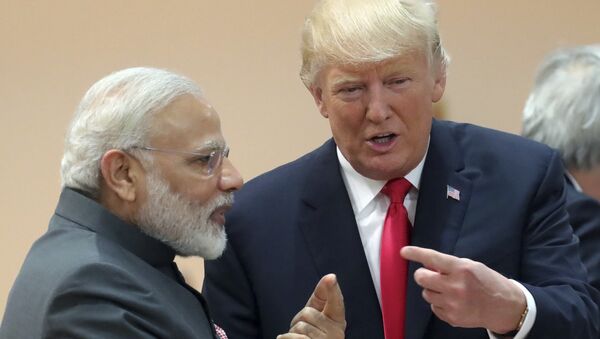US President Donald Trump has triggered a major controversy in India as he claimed on Monday that Indian Prime Minister Narendra Modi requested him to mediate on Kashmir. Trump, who hosted the Prime Minister of Pakistan at the White House, also said that if asked, the US could help bring peace to the region.
"I was with Prime Minister Modi two weeks ago and we talked about this subject and he actually said 'Would you like to be a mediator or arbitrator', I said 'Where', He said 'Kashmir'. Because this has been going on for many, many years…I was surprised. I think they would like to see it resolved and you (Imran Khan) would like to see it resolved. If I can help, I would love to be a mediator," President Trump said at the joint press briefing with Imran Khan.
US President Donald Trump's response to #Pakistan Prime Minister Imran Khan asking for support to push peace talks with #India.
— Devirupa Mitra (@DevirupaM) July 22, 2019
"I met Indian PM Modi two weeks ago.. he asked me, do you want to be mediator, arbitrator.. I asked where? He said #Kashmir" pic.twitter.com/odOS7e5uKe
Trump stated that its impossible to believe that “two incredible countries” with “very very smart leadership can not solve a problem”.
In response to the offer, the visiting Pakistani Prime Minister said: "Mr President, I can tell you right now, you will have prayers of over a billion people if you can mediate and resolve the situation".
“I have heard so much about Kashmir, such a beautiful name…right now its just bombs all over the place. Everywhere you go you have bombs, it’s a terrible situation going on for years,” Trump emphasized, while reiterating his mediation offer to the two countries.
The statement came nearly a month after Trump met Modi on the sidelines of the G20 Summit in Osaka, Japan.
However, the Indian foreign ministry denied the claim made by Trump and said that no such request had been made by PM Narendra Modi to the US President.
"It has been India's consistent position that all outstanding issues with Pakistan are discussed only bilaterally. Any engagement with Pakistan would require an end to cross border terrorism. The Shimla Agreement & the Lahore Declaration provide the basis to resolve all issues between India & Pakistan bilaterally," the ministry added.
...that all outstanding issues with Pakistan are discussed only bilaterally. Any engagement with Pakistan would require an end to cross border terrorism. The Shimla Agreement & the Lahore Declaration provide the basis to resolve all issues between India & Pakistan bilaterally.2/2
— Raveesh Kumar (@MEAIndia) July 22, 2019
Pakistan has been attempting to raise the issue of Jammu and Kashmir at international fora, including at the United Nations, UN Human Rights Council and Organization of Islamic Countries for years, but India has been maintaining its position that the “entire State of Jammu and Kashmir is an integral part of the Indian Union and there is no role whatsoever for a third party in this regard”.
Relations between the two countries nosedived in February of this year, after 40 Indian soldiers were killed in a suicide attack carried out by Pakistan-based Jaish-e-Mohammed on February 14. On 26 February, the Indian Air Force conducted an aerial strike and destroyed alleged terror infrastructure in Balakot, inside Pakistan. The following day, the Pakistani Air Force retaliated and shot down an Indian fighter jet while in a dogfight, in which it also lost a frontline F-16 fighter jet.
The Kashmir dispute dates back to 1947, when shortly after India and Pakistan gained independence from British colonial rule, Pakistani forces along with local militia attacked the Kashmir valley region ruled by Maharaja Hari Singh, who, after initially resisting the idea, acceded to India, much to Islamabad's dismay.


